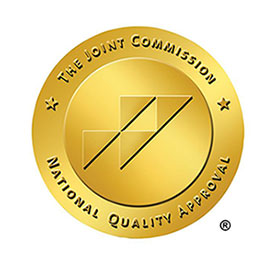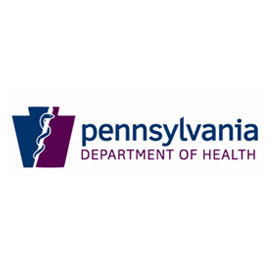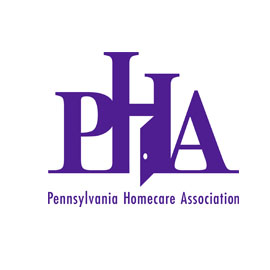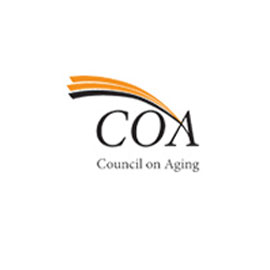Employee Wellness
DNA is Dedicated to our Employee's Health and Well-Being
COVID-19 Information
With the recent outbreak of the Coronavirus (COVID-19), we wanted to inform our employees about the best practices. As we continue to receive information, we'll update these guidelines.
This page was last updated on Wednesday, January 3rd, 2024.
Vaccines are safe and effective and the best way to protect you and those around you from serious illnesses.
All Pennsylvanians ages 6 months and older are eligible to receive a COVID-19 vaccine. Those aged 6 months to 18 years require a parental consent. Learn more about the pediatric vaccine.
All adults in Pennsylvania and children ages 5 and older are now eligible for a COVID-19 vaccine booster. Based on CDC recommendation, everyone 18 and older can schedule a booster dose five months after receiving their second dose of Pfizer or Moderna or two months after receiving the Johnson & Johnson vaccine. The CDC also recommends that 5 to 17-year-olds who received Pfizer-BioNTech as their initial doses can schedule a Pfizer booster dose 5 months after receiving their second dose.
All adults ages 50 and older, as well as Pennsylvanians age 12 and older who are moderately or severely immunocompromised, are recommended to receive a second COVID-19 vaccine booster 4 months after their first booster. Based on CDC recommendations, those 50 and older and those 18 and older who are moderately or severely immunocompromised can choose to get either a Pfizer-BioNTech or a Moderna booster. 12 to 17 year olds who are moderately or severely immunocompromised are recommended to receive the Pfizer-BioNTech booster. Learn more about COVID-19 vaccine recommendations for people who are moderately or severely immunocompromised.
Looking for a replacement COVID-19 vaccine card? We can help by sending you a record of your immunizations! Please visit the PA-SIIS page and complete the Authorization for Release of Immunizations Records Form.
Source: COVID-19 Vaccine (pa.gov)
You are up to date with your COVID-19 vaccines when you have received all doses in the primary series and all boosters recommended for you, when eligible.
- Vaccine recommendations are different depending on your age, the vaccine you first received, and time since last dose, as shown below.
- Learn more about COVID-19 vaccine recommendations specifically for people who are moderately or severely immunocompromised.
When putting on or taking off Personal Protective Equipment (PPE), it's essential to follow proper procedures. Before caring for patients with confirmed or suspected COVID-19, make sure you have adequate training on the limitations of PPE, proper care, maintenance and disposal.
To learn more, watch the video here and review the document below.
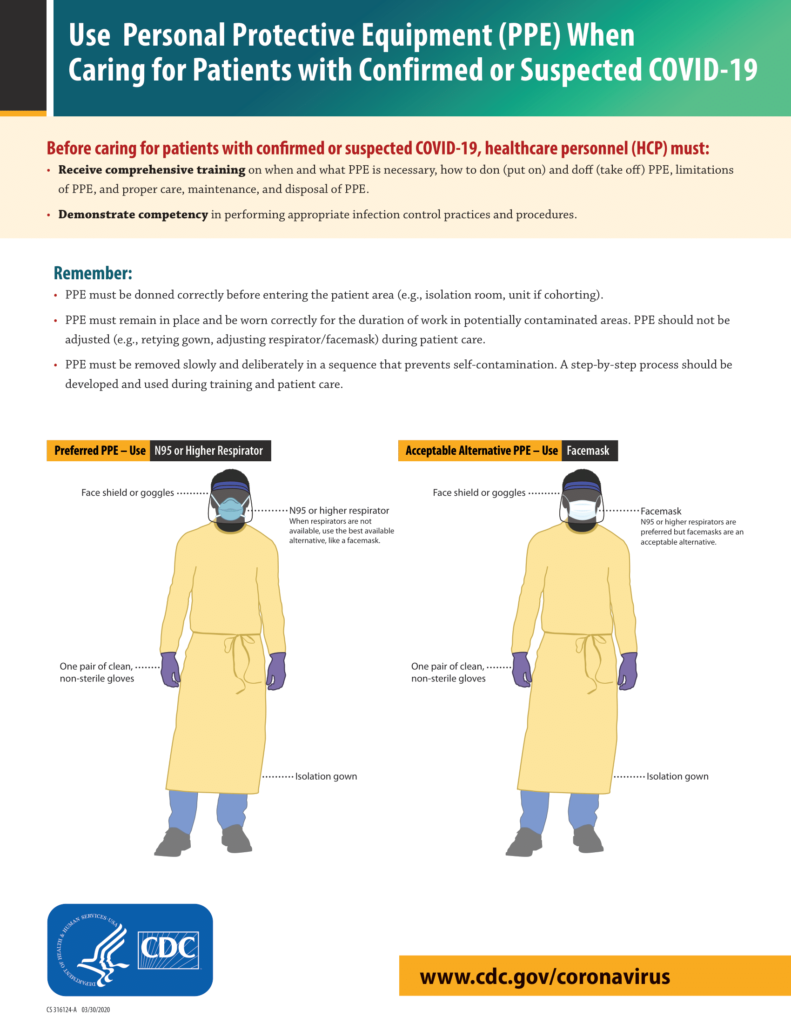
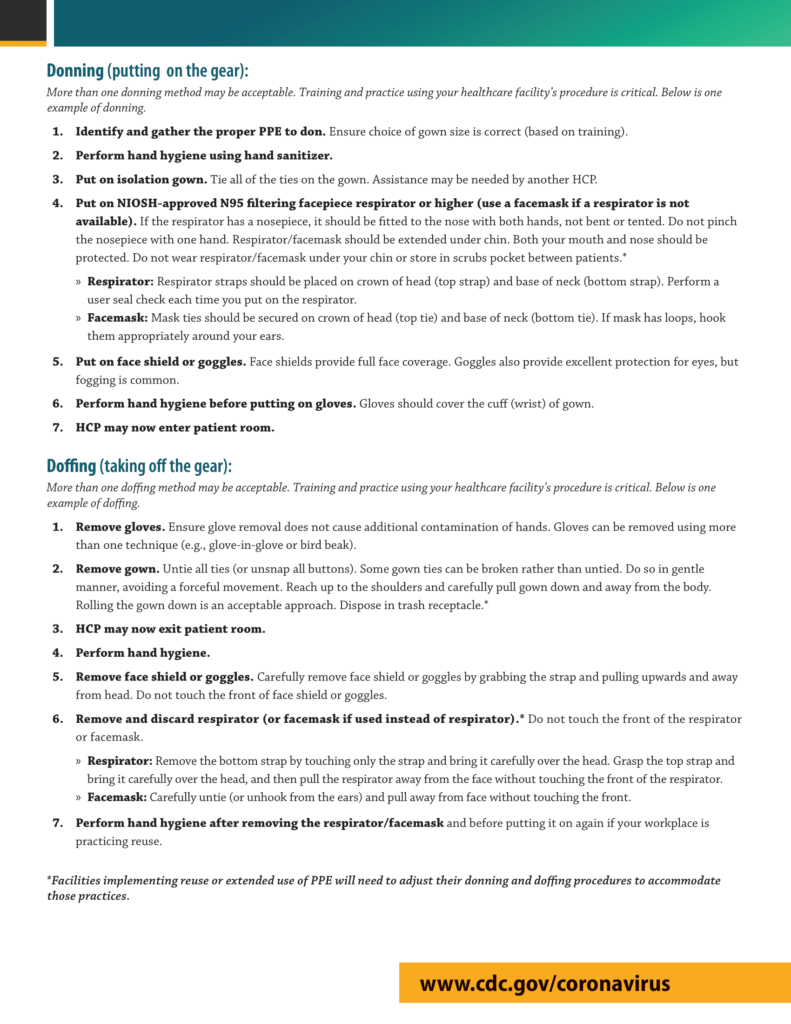
- Wash hands frequently and for at least 20 seconds after using the restroom, eating, and touching surfaces in public places.
- For proper handwashing techniques, click here.
- If soap and water is not available, use a hand sanitizer, with at least 60% alcohol, when coming into contact with door handles, railings or shared spaces.
- Avoid touching your face, eyes, and mouth. Avoid shaking hands.
- Wipe down areas used before and after meal prepping and eating (break rooms, office spaces, etc.).
- Wipe down commonly used items such as cell phones, office phones, writing utensils, computer mouse and keyboard carried in and out of the home, stethoscopes, and BP cuffs, etc.
- Sneeze/cough into elbow/arm NOT your hands.
- Utilize these same precautions when at home and in your personal life as you do in the workplace.
- Practice "Social Distancing" by staying at least 6 feet away from others.
If an employee is sick, especially with the following symptoms, DNA asks that you remain at home until symptoms have subsided. People with COVID-19 have had a wide range of symptoms reported - ranging from mild symptoms to severe illness. Symptoms may appear 2 - 14 days after exposure to the virus. People with these symptoms may have COVID-19:
- Fever or chills
- Cough
- Shortness of breath or difficulty breathing
- Fatigue
- Muscle or body aches
- Headache
- New loss of taste or smell
- Sore throat
- Congestion or runny nose
- Nausea or vomiting
- Diarrhea
This list does not include all possible symptoms. The CDC will continue to update this list as we learn more about COVID-19.
Children have similar symptoms to adults and generally have mild illness.
This list is not all-inclusive. Please consult your medical provider for any other symptoms that are severe or concerning to you.
Source: https://www.cdc.gov/coronavirus/2019-ncov/symptoms-testing/symptoms.html
If feeling sick, follow the steps as outlined below:
- If you reside in Pennsylvania, please see the PA HAN guidelines for returning to work
If COVID-19 spreads to one of our home health communities, a plan has been created and instructions will follow.
Until then, we encourage all employees to follow the above guidelines and practice effective hygiene techniques.
Influenza Information
Protect yourself and those around you during flu season! Seasonal influenza, also known as the flu, is an illness that causes fever, headache, tiredness, cough, sore throat, nasal congestion and body aches.






